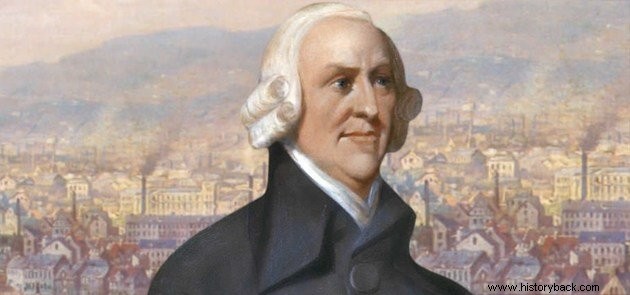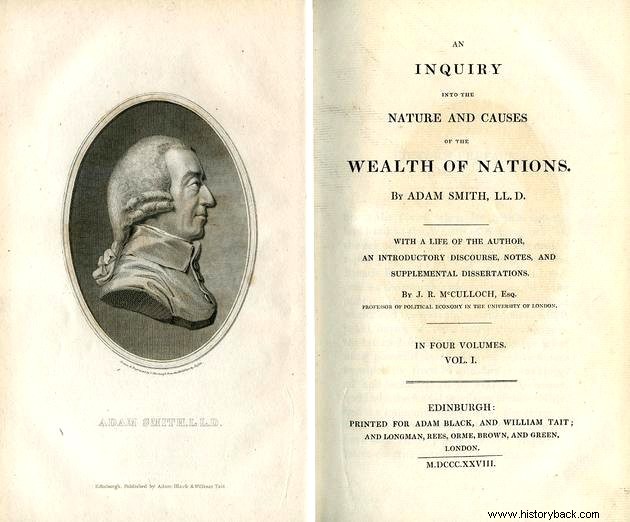Adam Smith (1723-1790) was a Scottish Enlightenment economist and social philosopher and is considered the Father of Modern Economics.
He addressed issues such as economic growth, ethics, education, division of labor, free competition, social evolution, etc.
Biography
The son of lawyer Adam Smith and Margaret Douglas, Adam Smith was born in the small port town of Kirkcaldy, Scotland, on July 16, 1723.
There was no industrial activity there except a pin factory. Observing the organization and functioning of this establishment, Adam Smith will get in touch with the new forms of production.
He lost his father when he was just two months old. He was enrolled at the College “Burgh School of Kirkcaldy ”, where he studied Latin, mathematics, history and writing.

In 1737, at the age of 14, he entered the course of philosophy at the University of Glasgow. He graduated in 1740, the year he won a scholarship to study at the “Balliol College ”, from the University of Oxford.
He taught classes in rhetoric and philosophy, being appointed Professor of the Chair of Logic, at the University of Glasgow (1751). And later, in 1758, he was elected rector of the same university. There he would be friends with the philosopher David Hume who would so influence his thinking.
In addition, he was tutor to the Duke of Buccleuch, accompanying him on trips to Toulouse and Paris, France, and Geneva, Switzerland. In addition, he was a customs inspector in Edinburgh from 1777.
Adam Smith was never married and little is known of his intimate life. On July 17, 1790, the economist died in Edinburgh.
Adam Smith's thought would found economic theory and his works are references for economists and philosophers around the world to this day.
Curiosity
Adam Smith, about 4 years old, was kidnapped by gypsies, and luckily, rescued.
Intellectual Influence
One of the great influences on Adam Smith's thought was the thought of the Scottish philosopher David Hume. For Hume, there was a relationship between natural morality, based on selfish impulse, and altruism.
More than kindness, what led the human being to act correctly was survival. Curiously, this was positive, because when thinking about himself, the individual ended up benefiting his surroundings several times.
In 1759, Adam Smith published “Theory of Moral Sentiments ”. In this work, he critically analyzes the morals of his time and human nature, seeking to understand his motivations to act in society.
See also:Enlightenment philosophersMain Works
- Theory of Moral Sentiments (1759)
- An inquiry into the nature and causes of the wealth of nations (1776)
- Essay on Philosophical Themes (1795).
The Wealth of Nations

Adam Smith took notes for more than thirty years on various subjects, and it took ten more to create his great work “An Inquiry into the Nature and Causes of the Wealth of Nations ”. The work would become better known as "Wealth of Nations".
There, he explains the nature of the economic system, the changes that the economy underwent in the 18th century and points out new paths in the face of the English Industrial Revolution that was in its infancy.
See also:EnlightenmentEconomic Nature
For Smith, the economy is driven by the private interest of individuals.
Example:A worker doesn't get up every morning just because he loves his job or wants to do good. He knows he needs this occupation to survive. However, with this gesture, he helps the whole society, because thanks to his effort, the people who depend on him, are also benefited.
Smith said that even if it was not intentional, people's selfishness redounded to the common good.
Invisible Hand
The metaphor of the invisible hand would become the most famous figure in economics and the motto of economic liberalism.
Adam Smith uses it to explain that the “invisible hand” leads human beings to prefer to consume products from domestic and not foreign industries.
The concept of “invisible hand” will be used to explain the laws of the market and the adjustment between supply and demand.
See also:Law of Supply and DemandDivision of Labor
Adam Smith advocated that work should be carried out in stages, so that each worker would improve and improve their efforts throughout production.
Equally, he transposed this idea to nations, stating that each should specialize in making only certain products with the aim of selling them on the market.
This would create a skilled workforce and technical expertise that is difficult to overcome.
See also:Capitalist mode of productionMercantilism
In the 18th century, the idea prevailed that the wealth of a nation was the amount of gold and silver stored in its coffers. For this, state intervention and obstacles to foreign trade were necessary. This set of measures was called Mercantilism.
Adam Smith rejects this idea and explains that the wealth of a country resides in its ability to produce goods. For this, it must have qualified citizens and a State that is not an intervener.
Smith advocated freedom of contract (between employers and employees), private property and the state not to interfere in the economy.
Physiocracy
Adam Smith undertook a trip to France, from 1764-1766, which would be decisive in his life. In this country he met the most important physiocrats of the time:François Quesnay and Anne Robert Jacques Turgot. From this meeting, Smith's interest in economics was born.
The Physiocrats were based on the primacy of natural law, the power of land and owners, the freedom to sell and buy.
For them, the best form of government would be one in which things would work themselves out, summarized in the French expression "laissez-faire " (let it do).
A year later, he returns to Scotland and begins writing his masterpiece. However, Scotland's situation was very different from France. United with England since 1707, the political scene was more stable than the French one.
Thus, steam engines were invented by James Watt, who was a personal friend of Adam Smith. His invention allowed the creation of the locomotive, railways and large factories that would completely change the landscape and the world economy.
Adam Smith didn't get to see the great factories of the Industrial Revolution, but he knew how to anticipate the changes they would bring to the world.
See also:PhysiocracyAdam Smith Quotes
- What will generate the wealth of nations is the fact that each individual seeks their personal economic development and growth.
- Where there is great property, there is great inequality. For the very rich, there are at least five hundred poor people, and the wealth of the few presumes the indigence of the many.
- Science is the great antidote to the poison of enthusiasm and superstition.
- It is unfair that the whole society contributes to defray an expense whose benefit goes to only a part of that society.
- It is the fear of losing your job that curbs your fraud and corrects your negligence.
- The universal ambition of men is to live reaping what they never sowed.
- The wealth of a nation is measured by the wealth of the people and not by the wealth of princes.
- The real value of things is the effort and trouble of acquiring them.
- No nation can flourish and be happy while a large part of its members are poor and miserable.
Read more :
- Macroeconomics
- Keynesianism
- Capitalism
- Liberalism
- Questions about Capitalism
